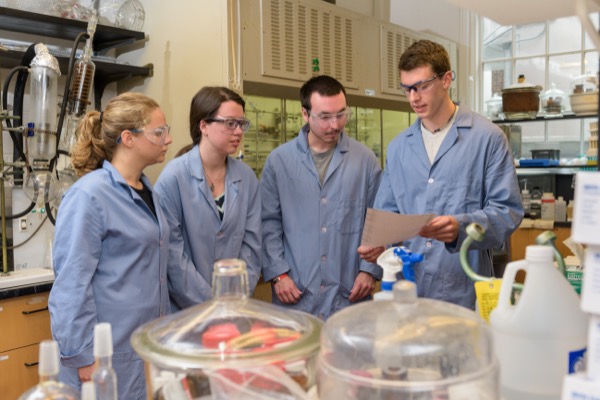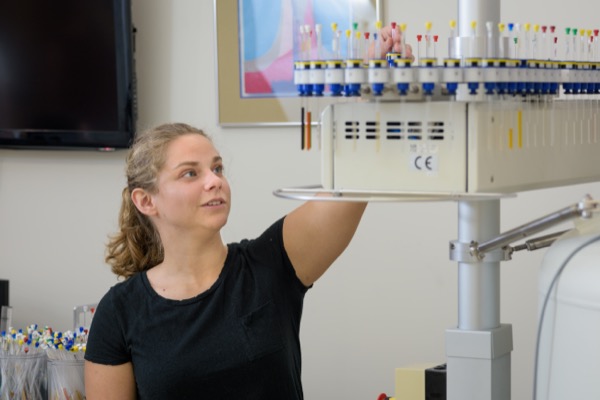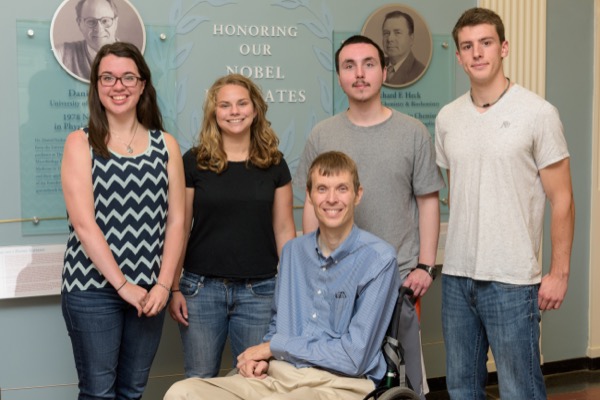


Emphasis on ability
Students with disabilities develop their research skills in UD program
8:58 a.m., Aug. 4, 2015--For Casey Kneale, being part of an undergraduate research program at the University of Delaware for students with disabilities last summer was a pivotal experience, leading him to redirect both the focus of his studies in chemistry and his goals for a future career.
This summer, he’s back on campus as an incoming UD graduate student, hoping to help others find the same kind of direction and support he received from the Science and Engineering Leadership Initiative.
Campus Stories
From graduates, faculty
Doctoral hooding
The three-year-old initiative, designed and led by Department of Chemistry and Biochemistry faculty members Karl Booksh and Sharon Rozovsky, is supported by the National Science Foundation through its REU (Research Experiences for Undergraduates) program.
“I came here last year looking for community with other students who have disabilities and for experience doing research, and I got so much out of it,” said Kneale, who plans to earn a doctorate in analytical chemistry and to work in academia. “I was on the fence about graduate school before, but the program made me realize that if I ran into problems, there would be support for me here.”
Being part of the eight-week summer program with other students who had a range of disabilities “opened my eyes,” he said, to the fact that they all faced different types of obstacles but also shared many similar experiences, particularly in dealing with others’ stereotypes. “We’re all different, but in some ways we’re all in the same boat,” Kneale said.
Those kinds of obstacles and stereotypes — and the ways in which they have limited the number of students with disabilities who pursue advanced degrees, especially in the STEM (science, technology, engineering and math) fields — are the reason that Booksh and Rozovsky first proposed the summer program.
The two colleagues had worked together on other projects and began discussing the issue in which they both had a personal as well as professional interest; Booksh uses a wheelchair, and Rozovsky was inspired by an undergraduate co-worker who used crutches.
“Our program offers mentoring and research opportunities to students who are outstanding scholars who happen to have a disability,” Booksh said. “They need to be recognized for their unique abilities and encouraged to pursue STEM fields.”
This summer’s 10 participants came to UD from 10 institutions of higher education. All are studying chemistry or a related discipline, and many said they applied to the program as much for the supportive community as for the research opportunities. They also said they had experienced the social stigma of having a disability and the perception from some people that they were limited academically.
“I need some assistance in the lab at times, but I didn’t want to give up chemistry, and I thought it would be a good experience to meet other students with disabilities,” said Dana Reigner of Arcadia University, who had a brain injury three years ago that left the right side of her body weaker than the left. “I’ve loved chemistry since sophomore year of high school, and I want to continue to study it.”
For Bryce Lipinski, a senior majoring in chemistry at Siena College and preparing to apply to graduate schools, the opportunity to get laboratory research experience at a larger institution was key to his decision to attend the UD summer program.
Lipinski has a decoding issue, a derivative of dyslexia, which makes practices such as reading textbooks a more difficult and time-consuming process. However, he said, focusing in organic chemistry — where the structure and functions of molecules are often best described using graphics instead of words — fits his skills exceptionally well. But standardized exams, for example, are unlikely to give a true picture of his knowledge and academic strengths.
“That’s where research programs like this are extremely important,” he said. “Having this experience in the lab shows what I can do beyond a grade on an exam.”
In addition to the hands-on research experience with faculty mentors, students in the program also receive information and guidance on such subjects as the graduate school application process, how much to disclose about their disability and how to negotiate for accommodations. And, participants said, they’ve also learned more about themselves and others by working and socializing with one another.
“We hang out together, and it’s made me realize the different challenges that we all face,” said Savannah Stark of Warren Wilson College. “I think we’ve all experienced the stigma of having a disability and the constant pressure of feeling like you have to prove yourself — the feeling that if you make a mistake, people think it reflects on everybody with a disability.”
More programs that focus on inclusion for students with disabilities will go a long way to address the problems of stigma and stereotypes, Booksh said.
“It can be a vicious cycle, where people with disabilities are underrepresented [in academic programs and especially in STEM], and so there’s lack of role models and mentors for younger students,” he said. “This individualized program is great for the participants, but more needs to be done.”
Article by Ann Manser
Photos by Evan Krape










